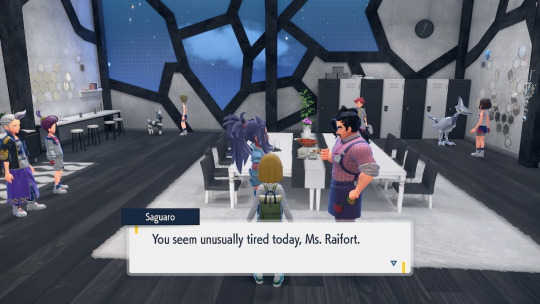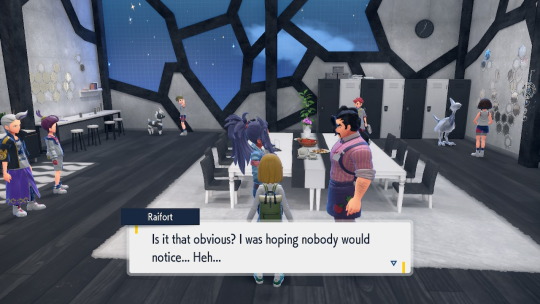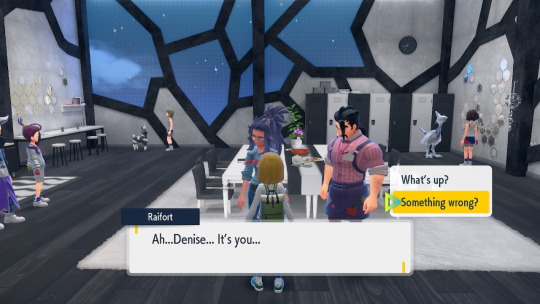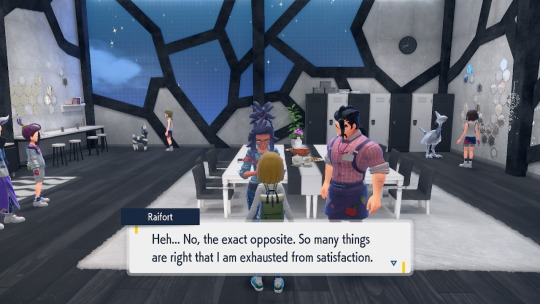#and she voices her distaste about this (plus that of her teaching style in general) very openly
Explore tagged Tumblr posts
Text




POV: you're Dena and your favorite teacher is trying to cover up the fact she's fucking your mom
#mel's musings#forest for the tree#me everyday for the past 2 weeks: *wakes up in a cold sweat* jen x raifort toxic yuri.....jennifort......#she claims she's been staying up late doing research and investigating ruins. which yeah sure whatever#but i don't believe for a second she's not ALSO having nasty gay sex on the side. these lines had me REELING lmao#so here's my vision. jen is also a teacher at naranja academy in this au so she and raifort are coworkers#basically jen thinks she's sus af and is concerned about the fact her daughter seems to adore her (bc dena's super into myths and shit)#she gets SUPER pissed about her putting dena in danger with the treasures of ruin quest bc she perceives it as using her#and she voices her distaste about this (plus that of her teaching style in general) very openly#and this annoys raifort bc why is that so wrong if dena was 100% on board. also she has NO business telling her how best to teach#she tries to figure out how to retake control bc jen being wary is bad for the reputation she has to at least TRY to uphold @ the academy#and eventually she just thinks. “what if i seduced her about it lol"#and it actually WORKS. because jen is suuuper lonely w/ her husband gone and dena mostly living at school/traveling a lot#& raifort finds herself impressed w/ jen's knowledge of unovan AND johtonian legends (based on her upbringing and 1st marriage)#they didn't expect to get so attached. but they did & their mutual love for dena only adds to it (even if raifort won't admit to that hehe)#i have a LOT of feelings about her secretly having a softer side underneath all the sussy shit and how she becomes a mentor for dena#but i think i'll save that for another post bc i've already rambled here quite extensively#so yeah. the raifort brainworms are SUPER real rn can you tell. also yes i'm gay for her too is that even a question#mel plays scarvi#nsft
1 note
·
View note
Text
Changing Tides | 9

Summary: At a young age you thought you had your life all figured out. You would marry your crush and become a world renown artist. It was perfect. That is until a childhood friend, your clumsy cousin, an intimidating rival, a nosy neighbor, an art prodigy, a beautiful dancer and a perfectionist workaholic destroyed those plans for better or for worse.
Pairing: some f. reader x Hoseok, f. reader x Jungkook, and f. reader x Jimin
Genre: Slice of Life, awkward teenage years to college au, eventual romance, angst, fluff
Word Count: 1874
Warnings: None
Prev | Next

You shift side to side as you wait outside the closed door. Really by now Hoseok should give you a key with how much you stop over. It'll at least help poor Jimin who has to open the door for you all the time. As you think that, said man opens the door wearing ripped jeans and a v neck shirt along with a smile.
"Hey y/n," he stands aside for you to enter. You do so and greet the kind man, taking your shoes off in the entryway. A variety of shoes line the shoe rack, some fancy and others more worn out than others. Seeing two pairs next to where you put yours has you frown. Of course, they are here too. Jimin notices your distaste at one specific set of boots.
"They've been at it awhile today already." Apologetically, he rubs at the back of his head. You sigh as you move through the nice apartment with Jimin following you.
The dancers' apartment is more on the expensive side, either from scholarships, loans, or rich family, but you didn't want to be nosy and ask. It's one of those large overpriced ones right near the edge of campus. Far enough to get some distance but easy to walk or bike to classes still. It made their apartment an easy hangout space as well.
The hard wood floor feels cool beneath your socked feet. The interior is of a contemporary design, filled with white and soft blue furniture and decorations with a dash of warm colors to show off some personality. Them also having the nicest apartment out of your group of friends might have played a factor in it being a hangout spot as well.
"With how much coffee Yoongi made earlier I'm sure they are going to be awhile still." Jimin adds from behind you.
"Then it's definitely time for a break." You don't see Jimin roll his eyes at you but you can certainly feel them. Despite your confidence, it's easy to tell that getting them to go on break anytime soon is a nearly impossible task. No one messes with Yoongi when he's on a roll with a fresh pot of coffee. Its more so disastrous to mess with Yoongi when he doesn't have one, so your glad there's that at least. Generally, no one messes with Yoongi at all, except for you. That's why Jimin is trailing behind as he finds the spectacle entertaining. The two of you have so much in common, but never actually see it because of the one man in common.
When you approach the door, you can hear low beats. It stops for a minute and then it starts back up again with the beats in a slightly different rhythm. A third of yourself hates yourself for breaking your cousin's concentration, another third just wants to hang out with Hoseok, and the last third wants to show Yoongi and everyone else you have no fear. Ok, well slight fear of the genius music student but not that you'll tell anyone. Well ok, except for Jungkook, Taehyung, and Jimin no one needs to know.
You’re at least polite enough to knock when the music is paused again. A moment happens and there's no response. You give Jimin a questioning look which he shrugs at. Hesitantly you reach your hand out for the door handle, but before you can reach it the door opens part way. All you can see into the room is black clothes, even darker hair, pale skin, and a beautiful face displaying a deep scowl at the sight of you. The way Yoongi is angled hides anything and anyone in the room from your view.
"We're busy, what do you want."
"I'm here to hang out with my friend." You put your hands together in a begging motion and tack on, "I can be quiet I swear, " when Yoongi continues to stare at you. An awkward beat passes and the door is shut in your face.
"Oh, come on!" you slam your fist on the door. Jimin bends over slightly from his laughing.
The door opens again this time with Namjoon standing on the other side. "Give us a few minutes kiddo." He gives you a tired smile, dimples showing, and pats you on the head when you pout. Jimin's toned down laughs rise back up into giggles making you push your cousin's hand off your head.
Jimin and you head down the short hall back to the living room. You lay on one of their couches as your temporary host goes into the kitchen. He puts a glass of water on the coffee table next to you and shakes his own protein drink bottle and sits on the couch adjacent to yours.
"You know they have a lot to prepare for before Hoseok goes on his trip."
You fling your arm dramatically over your head to cover your eyes.
"I know. I just need to get my fill of him before he leaves."
"Remember Yoongi needs his fill too."
"I know."
And that may be the reason the two of you can't get along. Yoongi and you started off on the right foot actually, and were quite friendly towards each other. That is until the both of you learned of each other's not so secret crush towards Hoseok. Instead of handling things like reasonable adults and talking it out, the two of you fight over his attention like children. The only time the two of you are amicable now is when Hoseok goes on a new date, and you two lovesick fools sit together in misery. The tension between you two has increased though after Hoseok announced he would be leaving abroad.
"It'll just be a couple of weeks. The two of you can manage you know. Maybe you could use that time to actually get along."
Your response is a grumble into your elbow.
"Plus, now you two can keep me company."
You move your arm to look at him in the eye.
"Does that mean you’re taking a break."
"Hell no" Jimin tips his bottle towards you before taking a big gulp of it.
"You and Minsuh really need to chill on the practice. You're going to wear yourselves out."
Jimin places his drink on the coffee table and stretches out on his smaller couch to stare up at the ceiling.
"You know she has a lot of stress from her parents about this competition. Once its over we'll get a break."
"Yep, until you immediately have to get started for the next one that is."
"Well how is your painting going then."
You frown at that because he knows you are having a hard time with this one. Your teacher wants you to challenge yourself and try a new style for the next project. However, you may have bitten off a bit more than you could chew with your design. Moving away from portraits, you are aiming to do a kinetic environment painting. You've enlisted the help of Jungkook to teach you how to take long exposure photography shots for reference, and you have been studying Tae's style and application of paints along with other impressionist artists. It is a bit out of your comfort zone, but you are learning a lot during the whole procedure.
"It's going," you lie. Jimin's scoff tells you he knows that too.
The two of you sit in silence, lost in your own thoughts. A couple minutes turn into many and you doze off accidently as Jimin starts humming while reading one of his text books he pulls out. When you awake you notice a blanket covers you and that it’s a bit darker outside than it was earlier. Peeking over the couch arm you see that Jimin’s reading another book. Snacks and discarded wrappers fill the coffee table.
“How long have I been out.” You garble out, voice still thick with sleep.
Jimin glances at his phone, “Maybe somewhere between an hour or two.”
You sit up and stretch your arms over your head and feel a pull in your back. Grimacing, you cuddle back into the soft blanket. You clear your throat a little, “Thank you.”
Jimin smiles and gives you a nod in reply. He turns back to his reading and you pull out your phone to distract yourself. To two of you stay quiet and still except for the sounds of a turning page every now and then. That is until you hear the door down the hall open. Jimin giggles at how much you look like a puppy at that moment when you perk up at the sound.
Hoseok strides down the hall in his beautiful glory and sends you his famous smile.
"Y/N!" He plops down on the couch next to you and gives you a side hug that has you leaning into him. "Weren't waiting too long I hope?" "Nope," you smile back at him and doing your best to hide your tiredness as you cuddle into him even more. "Jimin kept me good company."
"Just good company?" questions Jimin, slightly affronted.
"The best company." You decide to indulge the man who grins happily until his eyes disappear into crescents.
Talented hands weave into to your hair and scratch at your head. The feeling has you closing your eyes in bliss. "Great. I expect you two to keep each other company while I'm gone."
"I'll be fine Hoseok." His roommate complains sourly.
"The apartment won't stay clean if no one comes by to visit." Yoongi states as he and Namjoon enter the room. Both of them are eyeing the littered coffee table.
"He's right about that."
Jimin does his best to kick at the older two from his position from the couch, but they take a wide berth of caution around it to the couch you're sitting at. Namjoon pats your head again as he moves behind the couch to sit on the opposite end. Instead of squeezing in the small space between Namjoon and Hoseok, Yoongi perches himself right onto Hoseok's lap.
"Yah, get your own spot." You push slightly at Yoongi as everyone glances to the other couch where Jimin is stretched out with a look that says he is ready to start kicking.
"It's fine Y/N." Hoseok's hand leaves your hair to help balance the man on top of him as he pulls his phone out of his pocket with the other. Yoongi sends you a victorious smirk that you can't help but make a face at.
"Did you finish for the day?" You ask the man next to you who is smiling contently at his phone.
"Just taking a small break." He pats Yoongi's thigh as the oldest gets more comfortable on his lap.
"Just enough time to finish my documentary." Namjoon exclaims as he turns on the tv.
Its peaceful for a moment until the cutest little crab shows up on the screen.
"Really Joonie, crabs again?"
Namjoon looks at you like your crazy, "What's wrong with crabs?"
"Just you know I think I've seen this one about fifty times."
"She's right on that one Joon." Yoongi adds.
Embarrassed, Namjoon just tells you two to shut up.
#btsghostie#bts fanfiction#jimin fanfiction#hoseok fanfiction#namjoon fanfiction#yoongi fanfiction#sope#some reader x hoseok#Thanks ghosties who did word sprints with me!#my writing#changing tides#bts fluff#bts angst
7 notes
·
View notes